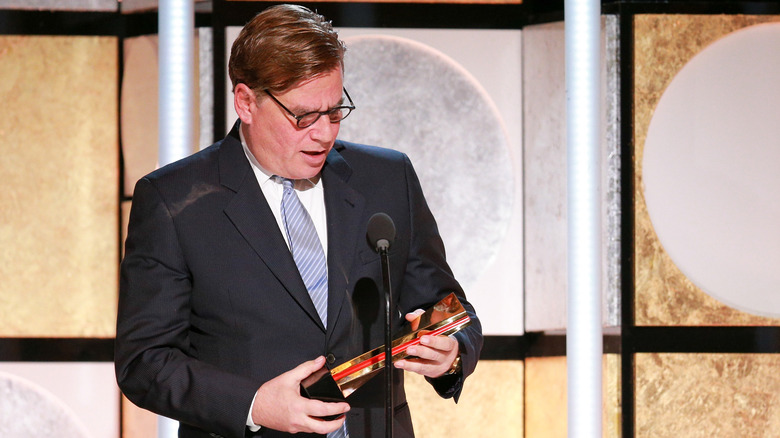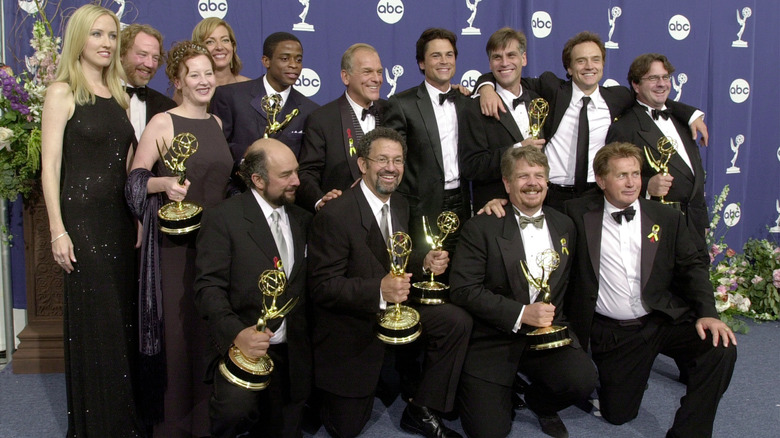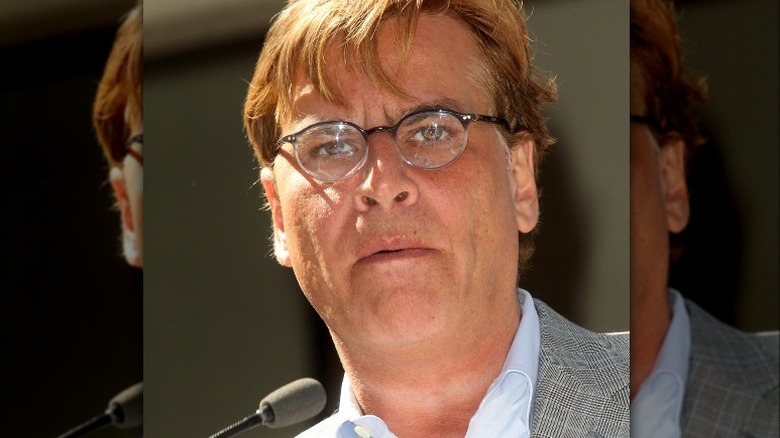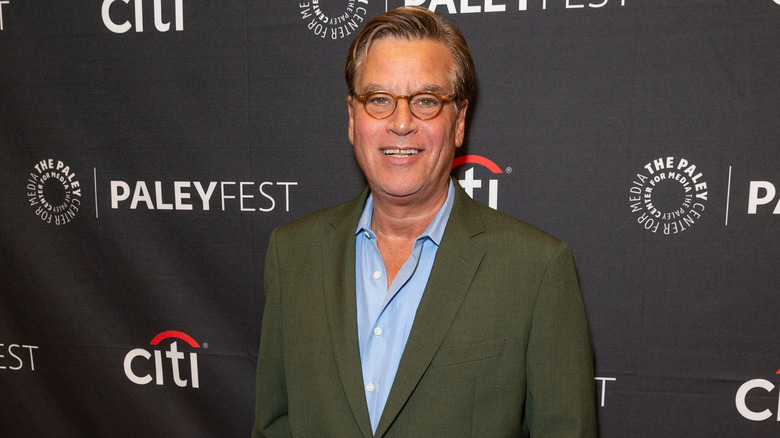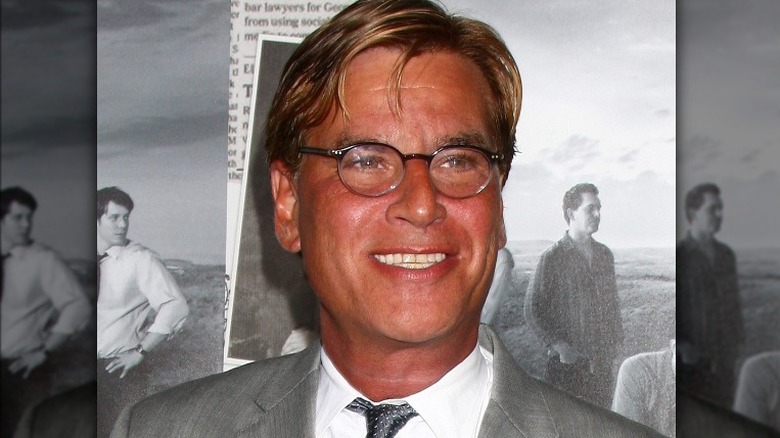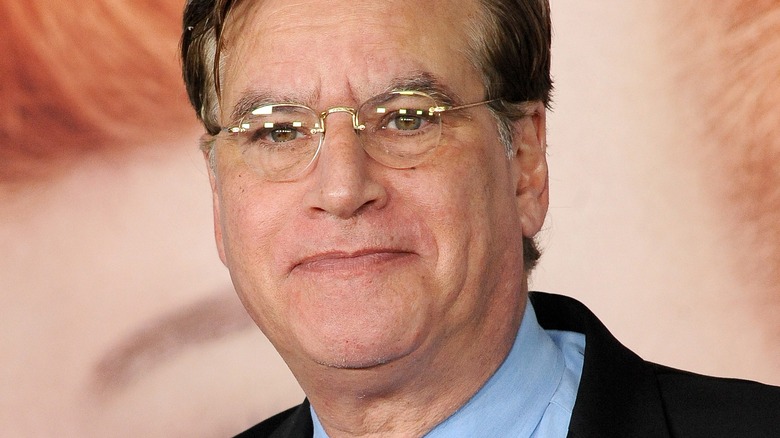Here's How Much Aaron Sorkin Is Really Worth
In terms of talent, screenwriter Aaron Sorkin is Hollywood royalty, and he's got both the awards and the bank account to prove it. For two decades, Sorkin's work has wowed audiences on television, the silver screen, and even Broadway. Historically, Sorkin's projects have high-caliber casts, and even higher-dollar budgets.
Screenwriting, however, wasn't actually his first passion. In fact, when Sorkin was younger, his goal was to be an actor. Like many who move to Manhattan to chase this dream, Sorkin struggled financially, but eventually found his way to screenwriting, and the rest is history. In 1992, Sorkin scored his first box office hit with "A Few Good Men," and since then, his writing genius has continued to reap him a massive following of die-hard fans, and millions of dollars in fiscal returns.
Despite Sorkin's plentiful cash flow, life in the spotlight hasn't always been perfect or easy. Even throughout some of his career's most lucrative years, the screenwriter has had his struggles. Is this a case of 'mo money mo problems'? Perhaps, but on the other hand, the talented — and especially the rich — tend to rise right back to the top. As for the Oscar and Emmy award-winning screenwriter's wealth today, read on to see how much Aaron Sorkin is really worth.
Aaron Sorkin is one of Hollywood's highest-paid writers
With an estimated $90 million net worth, Aaron Sorkin is known for spearheading one of television's greatest treasures, "The West Wing," and one of the box office's biggest smashes, "Moneyball." Those are just two of the many credits on his long list of successful projects, which also includes "The Newsroom," "The Social Network," and "Steve Jobs." Sorkin is known as one of Hollywood's highest-paid screenwriters, according to The Sun.
His first major move in the film world was "A Few Good Men," featuring a star-studded cast that included Tom Cruise, Jack Nicholson, and Demi Moore. The 1992 flick earned the whopping amount of more than $243 million worldwide. What followed was a 20-year span of continuously acclaimed film and television hits, many of which were also big earners. "The Social Network," for example, brought in almost $225 million worldwide at the box office. Over the years, Sorkin's achievements earned him approximately $4 million per script, and an extra $1 million if the piece was developed into a movie, according to The Sun.
Aaron Sorkin delivered singing telegrams
Long before writing award-winning shows and movies, Aaron Sorkin was a teenage drama club vice president with big dreams to work in theater, per The Hollywood Reporter. By attending high school in New York's Westchester County, specifically the suburb of Scarsdale (which Business Insider reported was "the richest town on the East Coast"), Sorkin had stellar opportunities to hone his craft.
Like many of life's plans, Sorkin's didn't turn out exactly as he'd envisioned. After graduating from Syracuse University in 1983, he moved to New York City and worked "a whole bunch of survival jobs," he told Vanity Fair. On "The Late Late Show with James Cordon," Sorkin confessed that his limo driving position only lasted three days. "Not only couldn't I find the airport..." Sorkin quipped, "but I would also hit many things along the way." Sorkin delivered $20 singing telegrams, as he told Ashleigh Banfield on NewsNation. He also dressed as a moose and passed out flyers in Times Square.
"You're a struggling artist in New York...pride is gone," he joked to Banfield. "You'll have pride in your 30s." With Sorkin's most fortuitous side-hustle, bartending at a Broadway theater, he used his breaks to draft the script of a lifetime. "I wrote 'A Few Good Men' on cocktail napkins during the first act of 'La Cage aux Folles,'" he shared on NewsNation. The film took him into the next chapter of his career, and propelled him forward to start acquiring his mass fortune.
He lobbied for a $10M West Wing alteration following 9/11
The terrorist attacks of September 11, 2001, changed the world forever. That day also necessitated some changes, and a modified budget, for one the country's hit shows, "The West Wing," written by Aaron Sorkin.
Although the first five episodes of Season 3 had already been shot, once 9/11 occurred, Sorkin realized major revisions were necessary. ”We have these eight characters who have been our friends for two years, and we want them to live,” Sorkin told The New York Times Magazine. ”And in order to do that, they have to bow their heads for a moment to what concerns the rest of the world. Once we've done that, it will give us permission to go back to telling the kind of relatively trivial stories I like about the N.E.A. and soft money and big tobacco.”
The decision to alter the new season came with a $10 million price tag, but as The New York Times Magazine noted, an NBC executive knew Sorkin to be "the real deal, a Hollywood money-minting freak of nature." Therefore, there was no doubt he would receive whatever accommodations were necessary to relaunch the start of Season 3. Sorkin's response to 9/11 was a special standalone episode that was to benefit New York Firefighters and Police funds, but it received mixed reviews, per The Harvard Crimson.
Arrested for drug possession, Aaron Sorkin was held on $10,000 bail
Aaron Sorkin repeatedly faced challenges with drugs. The Los Angeles Times reported that Sorkin admitted his cocaine addiction landed him in a treatment facility in 1995. In a 1999 interview with the outlet, he expressed concerns about a possible relapse. "I'm the same as any other addict," Sorkin explained. "I'm only a phone call away from getting loaded again."
Unfortunately, it seems that Sorkin foreshadowed his own fate, as he was arrested in April 2001 at the Burbank airport for suspected possession of hallucinogenic mushrooms. The Los Angeles Times stated that Sorkin actually fainted when he was met with police regarding his suspicious package. He was then booked at the Burbank City Jail for a few hours before he was released on a $10,000 bail.
"I lost my 30s," Sorkin shared on "Five Things with Lynn Hirschberg." He told the podcast host that he was celebrating 20 years of recovery in 2021, but he remembered his prior challenges. "You're living a very dark life, you're lying all the time. Your only thought is about, 'When can I hook up with my dealer?' ... And eventually, what happened after about 10 years is, I kind of hear the footsteps behind me." The screenwriter went to rehab, thinking he would use again. However, the 12-step program worked, and Sorkin moved on.
If you or anyone you know is struggling with addiction issues, help is available. Visit the Substance Abuse and Mental Health Services Administration website or contact SAMHSA's National Helpline at 1-800-662-HELP (4357).
Aaron Sorkin's politics are as liberal as his cash flow
Despite once telling The New York Times that he has "no political background ... no political agenda," Sorkin seems heavily invested in the Democratic party.
On OpenSecrets.org, a site that states they are "Following the Money in Politics," Sorkin's name is listed more than 70 times for making donations to various candidates and campaigns between 1999 and 2021. Recipients on the list included groups like the Progressive Patriots Fund ($1,000), Our Common Values PAC ($5,000 collectively), and the Democratic National Committee (multiple thousands), to name a few, as well as individual U.S. House of Representative candidates and even Barack Obama (at least $4,800) and President Joe Biden ($2,800).
According to a 2012 article in Forbes, OpenSecrets.org is actually missing an additional amount of Sorkin's donations, which were housed on the no longer active 'Huffington Post's Fundrace Database' site. "Fundrace also shows a $35,800 contribution to Obama Victory Fund 2012 that does not appear on OpenSecrets.org, for some reason," Forbes concluded. The outlet's report is a decade old, and Sorkin's current donation tallies aren't confirmed. Exact totals aside, it's clear that star-studded funds have their fair share of political pull.
The screenwriter's office is a decorator's dream
Not one to pinch pennies on politics, or decor, Aaron Sorkin hired celebrity interior designer Martyn Lawrence Bullard to spearhead the project of appointing his beautiful office on the lavish and historic Sunset Gower Studios lot in Hollywood. The property was originally built in 1921, and according to real estate site CommercialCafe.com, the market value for the entire lot is nearly $395 million. As for Sorkin's office, Bullard certainly filled the blank space with exquisite items in terms of interior design.
So why didn't Sorkin just decorate the space himself? "It's not that I have bad taste," he quipped to Architectural Digest. "It's that I have no taste." Bullard previously designed other Sorkin homes and offices, so he knew the man enough to nail his vision. "Aaron loves that 1940s writer's atelier vibe," the decorator told Architectural Digest, "so I designed the space as a cross between a classic Hollywood creative office and the executive suite of a studio powerhouse."
The magazine feature included photos highlighting even the finest details, such as the custom-designed cabinetry, cozy leather chairs from France, a Jonathan Adler sofa, and a Hermès throw blanket. "It's all very masculine and old Hollywood, but the floor and wall coverings give it a slightly hipper, more contemporary feel," Bullard added.
Aaron Sorkin owns a pricey Hollywood home
The property developer for Aaron Sorkin's home, John Bersci, originally purchased the house in 2006 for $2,450,000, but as told by Variety, the project required a ton of work. "Mister Bersci worked his renovation hocus-pocus, squeezed some blood from a turnip and turned this broken down old Pontiac into a mint Maserati."
In 2008, Sorkin bought the home for $6.1 million. The Sunset Strip-adjacent jewel is located in the Los Angeles neighborhood of Devlin Place, where former residents include Giselle Bündchen, Christina Aguilera, and Fred Savage.
At 3,700 square feet, the house sits on a cul-de-sac and has been dubbed "[d]ramatic, stylish & private" by Variety. It includes 4 bedroom and bathrooms, a pool, spa and "explosive head-on views." Sorkin's previous residential purchase was a nearly $5 million Beverly Hills estate he bought for his (now) ex-wife Julia Bingham, according to the Los Angeles Times.
He haggled with Sony over the Molly's Game budget
As a world-renowned screenwriter, Aaron Sorkin has obviously had multiple enticing project offers come across his desk at once. With regard to "Molly's Game," a true story about an Olympic skier turned professional poker ring leader, Sorkin felt it was worth the drop and swap from another previous deal he had with Sony.
The Hollywood Reporter revealed that Sorkin "was so eager to get started on it that he told [the producer] he was willing to be paid scale, cashing in only in success — just enough, he joked in an email that later went viral as part of the Sony hack, to let him 'pay [his daughter's] tuition in the meantime.'"
The "Molly's Game" project proceeded, and luckily snagged Jessica Chastain as the lead, but there was "a tug of war" regarding the movie's budget, per The Hollywood Reporter. Producer Mark Gordon provided more insight about why finances became such a battle. "Aaron had a very strong point of view and very strong vision, and he wasn't going to make the $15 million version of the movie." The final number was approximately $30 million, and Sorkin contributed his $1 million bonus, but "kept his $4 million fee," THR noted.
Aaron Sorkin's high-profile legal battle
As if writing Emmy-winning television shows and an Oscar-winning movie wasn't enough, Aaron Sorkin also decided to pen a Broadway script. Straying slightly from the original storyline of "To Kill A Mockingbird," however, didn't sit well with the estate of the legendary novel's late author Harper Lee. Deadline explained that the show's producer countersued for $10 million, and The Hollywood Reporter added that Sorkin's team needed to raise $7 million from investors. The case settled, but it was a tremendous headache for nearly a year and a half.
Aaron Sorkin spoke with "PBS News Hour" about his artistic approach to the adaptation. He said of his first written attempt, "I simply was trying to swaddle the book in bubble wrap and gently transfer it to the stage. The result was, that first draft was tepid." He added, "I saw that I didn't have to give Atticus [Finch] a flaw, that reading the book today, instead of back when I read it, he already had a couple. It's just that we were taught that they were virtues." LaTanya Richardson Jackson, who portrayed Calpurnia, told PBS that she was only interested in the project if Black women in service positions were shown in light "of the truth of who they really were, of their strength, of how philosophically they filled the void of living for most people."
It seems that Sorkin's artistic changes were worth the legal and financial difficulties for the project.
His lucrative deals and educational offerings
It makes sense for an expert in film and television writing to teach a masterclass on those topics. That's exactly what Aaron Sorkin has done, through the MasterClass platform online. Participants pay for video lessons from the best in the field, and Sorkin's class on the craft of screenwriting is one of many choices for members who pay $15 monthly. Students gave Sorkin's course fair critiques and were satisfied with the material.
As he began sharing his wisdom with aspiring writers, Sorkin continued his own projects. "The Trial of the Chicago 7," a film about a peaceful Vietnam War protest gone wrong, was supposed to be rolled out by Paramount prior to the COVID-19 pandemic. Given the economic crisis that ensued, new partnerships were forged to finalize the $56 million deal with Netflix. "...it isn't a case of extra riches all round," Deadline said, but at least the film found a home.
Perhaps one could say the same for Sorkin — he took a few left turns, but eventually landed in a comfortable place. While some come to Hollywood for the partying, the spotlight, and the cash, the actor-turned-writer knows fame comes with a price. Net worth aside, Sorkin's writing remains at the root of all he does, and at this point of his illustrious career, the cost sure seems worth it.



